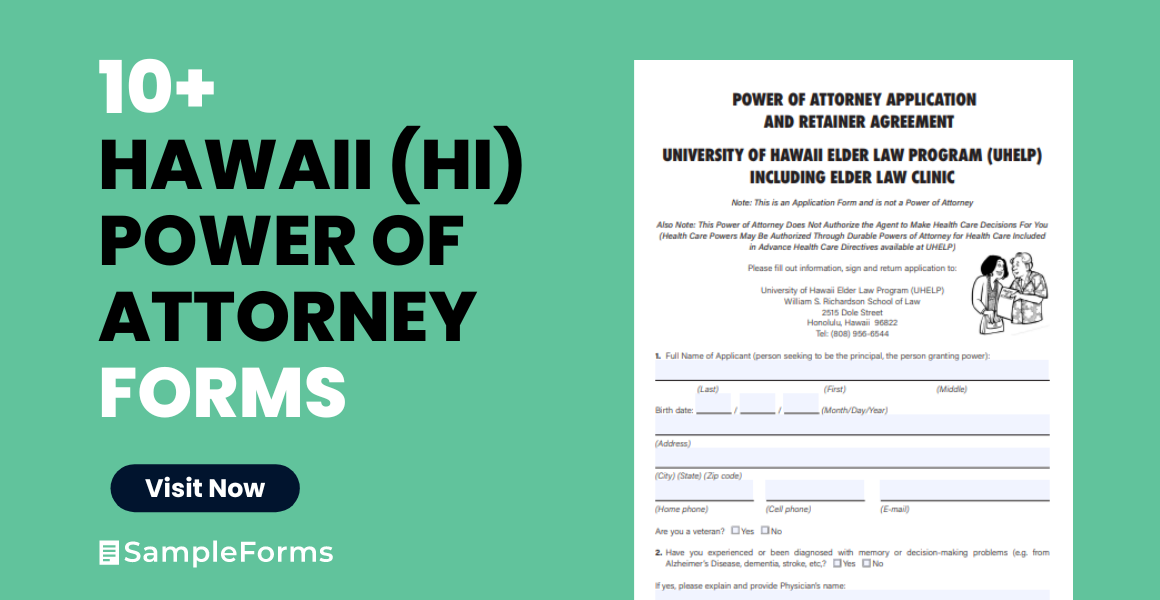Embark on a journey to master the Hawaii Power of Attorney (POA) Form with our comprehensive guide. Tailored specifically for Hawaii’s legal landscape, this guide offers invaluable tips and insights on effectively drafting and using a POA. Whether for financial, healthcare, or personal matters, understanding the nuances of Hawaii’s POA requirements is crucial. This introduction provides the key to creating a legally robust POA, ensuring your decisions are honored and your interests safeguarded in the Aloha State.
What is the Hawaii Power of Attorney Form?
The Hawaii Power of Attorney Form is a legal document that allows one person, known as the principal, to designate another individual, called the agent or attorney-in-fact, to make decisions and act on their behalf. This form can be used for various purposes, such as managing finances, handling real estate transactions, or making healthcare decisions. It grants the agent authority to act in the principal’s best interest under the conditions specified in the document.
What is the Best Sample Hawaii Power of Attorney Form?
Below is a sample template for a Hawaii Power of Attorney form. Please remember, this is a basic template and should be customized to fit specific needs and legal requirements. It’s advisable to consult with a legal professional to ensure the form meets all necessary legal standards and accurately reflects your intentions.
Hawaii Power of Attorney Form
Principal’s Information:
- Name: _______________________________________________________________________
- Address: _____________________________________________________________________
- Date of Birth: ________________________________________________________________
Agent’s Information:
- Name: _______________________________________________________________________
- Address: _____________________________________________________________________
- Relationship to Principal: ______________________________________________________
Powers Granted:
This Power of Attorney grants the following powers to the Agent:
- Financial Decisions: To manage and conduct all financial affairs and transactions.
- Real Estate: To buy, sell, rent, or manage real estate properties.
- Healthcare Decisions: To make healthcare decisions if the Principal is unable to do so.
-
[Additional powers or limitations]
Duration:
This Power of Attorney shall become effective on _______________________________ [Effective Date] and shall remain in effect:
- Until _______________________________ [Expiration Date], or
- Until the Principal becomes incapacitated (if Durable), or
- Until revoked by the Principal.
Durable Power of Attorney:
☐ This Power of Attorney is Durable and shall not be affected by the Principal’s incapacity. ☐ This Power of Attorney is not Durable.
Signatures:
- Principal’s Signature: ___________________________________ Date: _______________
- Agent’s Signature: _____________________________________ Date: _______________
Acknowledgment by Notary Public:
State of Hawaii, County of ____________________________________________________ This document was acknowledged before me on _______________ [Date] by __________________________ [Principal’s Name] and __________________________ [Agent’s Name].
Notary Public: ___________________________________________ My Commission Expires: __________________________________
Witnesses:
(As required by Hawaii law, two witnesses are needed)
- Witness Name: _________________________________________ Signature: _______________
- Witness Name: _________________________________________ Signature: _______________
Note:
This form is a sample and should be tailored to fit specific circumstances. It is crucial to ensure that the form complies with current Hawaii laws and regulations. Consulting with a legal expert is highly recommended for drafting a Power of Attorney form.
1. State of Hawaii Power of Attorney Form
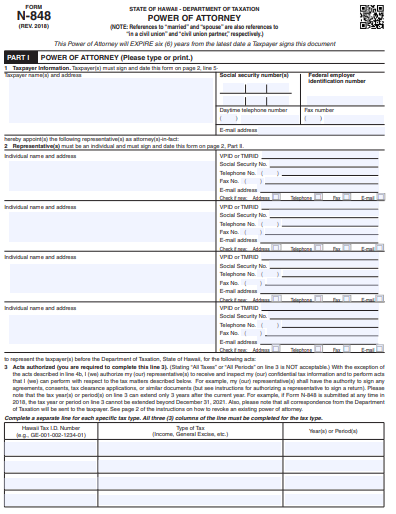
2. Hawaii Vehicle Power of Attorney Form
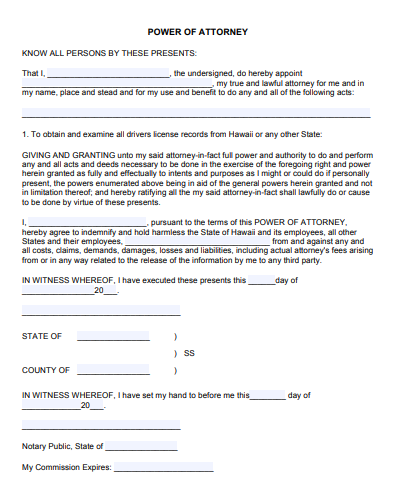
3. Hawaii Real Estate Power of Attorney Form
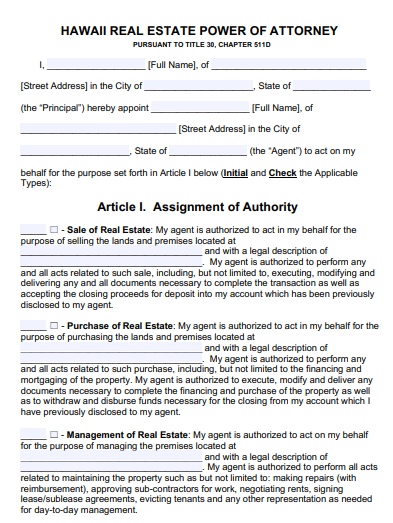
4. Hawaii Printable Power of Attorney Form
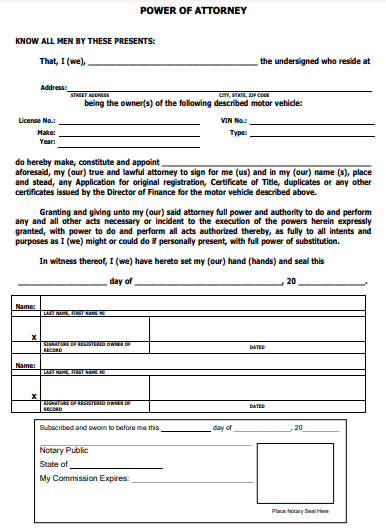
5. Hawaii Power of Attorney Form
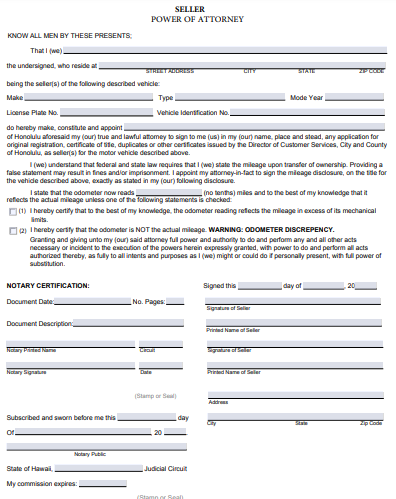
6. Hawaii Limited Power of Attorney Form
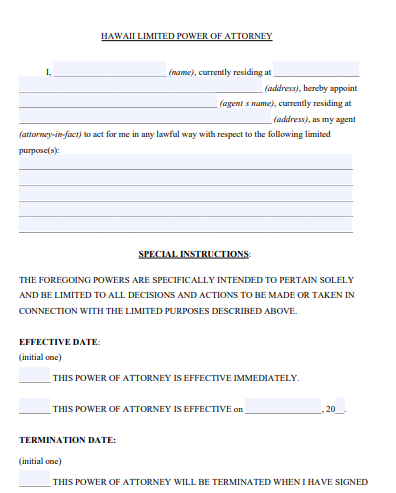
7. Hawaii Health Care Power of Attorney Form
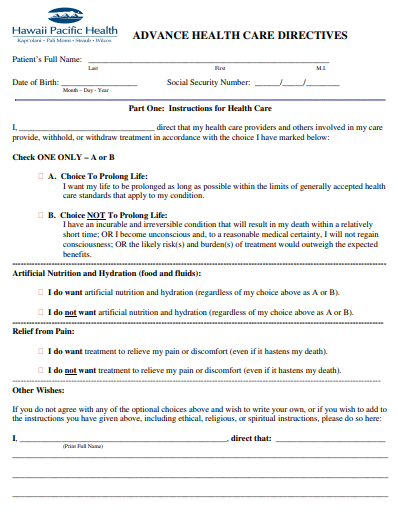
8. Hawaii General Power of Attorney Form
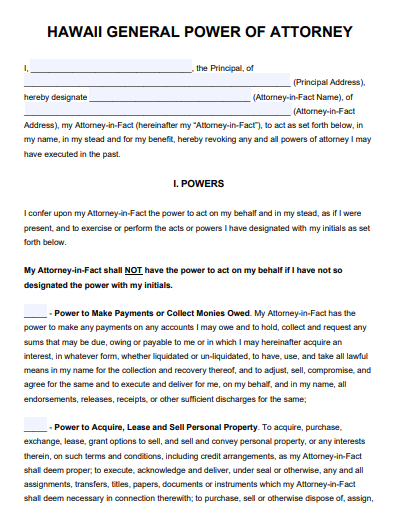
9. Hawaii Financial Power of Attorney Form
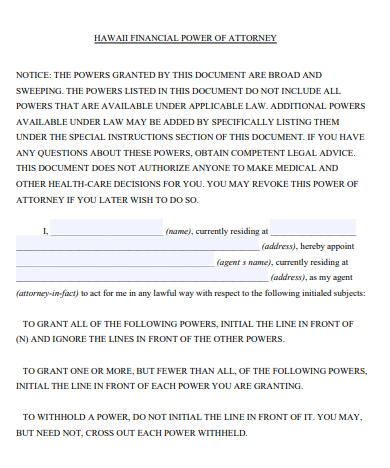
10. Hawaii Durable Power of Attorney Form
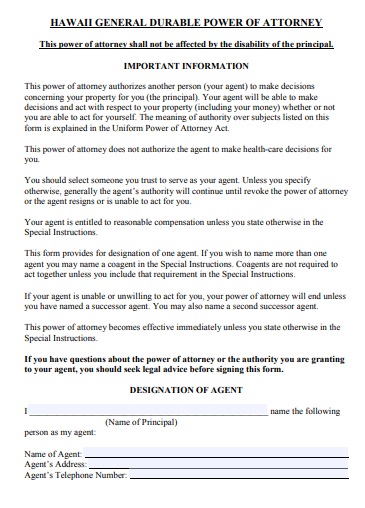
11. Free Hawaii Power of Attorney Form
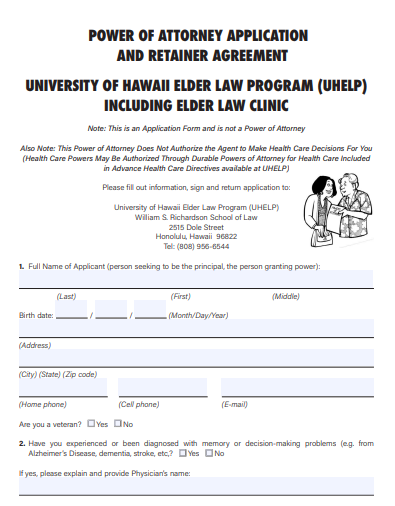
How do I get a power of attorney in Hawaii?
How long does a power of attorney last in Hawaii?
In Hawaii, the duration of a Power of Attorney (POA) depends on the type of POA and any terms specified within the document:
- Durable Power of Attorney: This type remains effective until the principal’s death unless revoked earlier. It continues to be valid even if the principal becomes incapacitated.
- Non-Durable Power of Attorney: This POA is effective only as long as the principal is mentally competent. It becomes invalid if the principal becomes incapacitated.
- Specific End Date: If the POA document specifies an end date, it will expire on that date unless revoked sooner.
- Revocation: The principal can revoke the POA at any time as long as they are mentally competent to do so.
- Death of the Principal: All POAs automatically terminate upon the death of the principal.
It’s important to clearly state the intended duration or conditions for termination in the POA document to avoid any confusion or legal issues.
What is a Durable Power of Attorney Form in Hawaii?
A Durable Power of Attorney form in Hawaii is a legal document that allows an individual (the principal) to appoint another person (the agent or attorney-in-fact) to make decisions on their behalf. The “durable” aspect of this form means that the power of attorney remains in effect even if the principal becomes incapacitated or unable to make decisions for themselves. This type of POA is often used for managing financial affairs, healthcare decisions, and other personal matters. It ensures that the agent can continue to act for the principal, even in situations where the principal cannot communicate or make decisions due to illness or disability.
What is the difference between power of attorney and guardianship in Hawaii?
| Aspect | Power of Attorney (POA) in Hawaii | Guardianship in Hawaii |
|---|---|---|
| Definition | A legal document where one person (the principal) grants another person (the agent) the authority to make decisions on their behalf. | A legal process where a court appoints an individual (the guardian) to make decisions for someone who is unable to make decisions for themselves (the ward). |
| Establishment | Created by the principal while they are mentally competent. | Established by a court when it is determined that an individual is unable to manage their own affairs. |
| Control | The principal has control over what powers are granted to the agent. | The court has control and decides the extent of the guardian’s powers. |
| Duration | Can be limited or ongoing, depending on the type of POA. Durable POAs continue even if the principal becomes incapacitated. | Generally ongoing until the ward regains capacity or passes away, or until the guardianship is otherwise terminated by the court. |
| Revocation | The principal can revoke a POA as long as they are mentally competent. | Only the court can terminate or modify a guardianship. |
| Decision-Making | The agent makes decisions as specified in the POA document. | The guardian makes decisions in the best interest of the ward, as overseen by the court. |
| Legal Process | No court involvement is necessary to establish a POA. | Court involvement is required to establish guardianship, including a legal determination of incapacity. |
| Purpose | Often used for specific purposes like financial management, healthcare decisions, or property matters. | Used for broader decision-making authority when an individual is deemed incapable of managing their own affairs. |
This table outlines the key differences between a Power of Attorney and guardianship in Hawaii, highlighting how each operates and the circumstances under which they are used.
What is a Power of Attorney in Hawaii for Healthcare?
A Power of Attorney for Healthcare in Hawaii is a legal document that allows an individual (the principal) to appoint another person (the agent or healthcare proxy) to make healthcare decisions on their behalf. This type of Power of Attorney becomes active when the principal is unable to make their own healthcare decisions due to incapacity or illness. The document specifies the extent of the agent’s authority, which can include decisions about medical treatments, healthcare providers, and end-of-life care. The principal can also outline specific wishes or guidelines for their healthcare in the document, ensuring their medical preferences are respected even when they cannot communicate them personally.
Can a Parent or Guardian Delegate Power in Hawaii?
Yes, in Hawaii, a parent or legal guardian can delegate certain powers regarding the care and custody of their child to another individual. This is typically done through a document known as a “Delegation of Powers by Parent or Guardian.” This legal instrument allows the parent or guardian to grant a temporary caregiver certain parental rights and responsibilities for a limited period, usually not exceeding one year.
The delegated powers can include making decisions about the child’s education, healthcare, and general welfare. However, this delegation does not terminate the legal rights of the parent or guardian and can be revoked by them at any time. This arrangement is often used when the parent or guardian is temporarily unable to care for the child due to reasons like illness, travel, or military deployment.
What is a Child Power of Attorney in Hawaii?
A Child Power of Attorney in Hawaii is a legal document that allows a parent or legal guardian to grant another adult the authority to make decisions and take certain actions regarding the care and welfare of their child. This arrangement is typically used when the parent or guardian is unable to care for the child due to circumstances like illness, military deployment, or extended travel.
The document specifies the powers granted to the appointed adult, which can include making decisions about the child’s education, healthcare, and daily activities. However, it does not terminate the parental rights of the parent or guardian. The Child Power of Attorney is usually temporary and can be revoked by the parent or guardian at any time. It’s a practical solution for ensuring the child’s needs are met during periods when the parent or guardian is unavailable.
How to Prepare a Hawaii Power of Attorney Form
Tips for Using Effective Hawaii Power of Attorney Form
1. Clearly Define the Powers Granted
- Be Specific: Detail the exact powers you are giving to your agent. This clarity prevents misunderstandings and potential misuse of authority.
2. Choose the Right Agent
- Trust and Capability: Select someone you trust who is also capable of handling the responsibilities effectively.
3. Understand Different Types of POAs
- Durable vs. Non-Durable: Know the difference and choose the type that best suits your needs, especially considering the issue of incapacity.
4. Comply with Hawaii Legal Requirements
- Witnesses and Notarization: Ensure your POA is properly witnessed and notarized as per Hawaii law.
5. Communicate with Your Agent
- Clear Instructions: Discuss your expectations and instructions with your agent thoroughly.
6. Keep the Document Accessible
- Safe but Accessible: Store the POA document where it can be easily accessed when needed.
7. Regularly Review and Update
- Stay Current: Regularly review and update your POA to reflect any changes in your situation or wishes.
8. Consider a Springing POA
- Control Activation: A springing POA activates only under specific circumstances, like incapacitation, offering more control.
9. Seek Professional Advice
- Legal Guidance: Consult with an attorney to ensure your POA is valid and meets all your needs.
10. Inform Relevant Parties
- Notify Institutions: Inform banks, healthcare providers, and others who may need to recognize the POA.
By following these tips, you can ensure that your Hawaii Power of Attorney form is used effectively, safeguarding your interests and ensuring your affairs are managed as per your wishes.
How Does Power of Attorney Work in Hawaii?
In Hawaii, a Power of Attorney allows you to appoint an agent to make decisions on your behalf, effective immediately or upon specified conditions, like incapacitation.
Does Hawaii POA Need Witnesses?
While Hawaii law requires notarization for a Power of Attorney, it does not mandate witnesses. However, having witnesses can add credibility to the document.
How Long is a Power of Attorney Good for in Hawaii?
A Power of Attorney in Hawaii remains valid until the principal’s death, revocation, or, if durable, until the principal becomes incapacitated.
What are the Limitations of a Power of Attorney?
A Power of Attorney cannot grant an agent authority to change the principal’s will, vote in public elections, or perform duties under a contract.
How Do I Revoke a Power of Attorney in Hawaii?
To revoke a Power of Attorney in Hawaii, provide a written notice of revocation to your agent and any institutions that have the POA on file.
Understanding and effectively preparing a Hawaii Power of Attorney form is crucial for ensuring your wishes are respected and your affairs are managed appropriately. By following the outlined steps and tips, you can create a legally sound and personalized POA, providing peace of mind and clarity for both you and your appointed agent in the beautiful state of Hawaii.
Related Posts
-
10+ Free New Hampshire (NH) Power of Attorney Form Download – How to Create Guide, Tips
-
10+ Free Nevada (NV) Power of Attorney Form Download – How to Create Guide, Tips
-
10+ Free Nebraska (NE) Power of Attorney Form Download – How to Create Guide, Tips
-
10+ Free Montana (MT) Power of Attorney Form Download – How to Create Guide, Tips
-
10+ Free Missouri (MO) Power of Attorney Form Download – How to Create Guide, Tips
-
10+ Free Minnesota (MN) Power of Attorney Form Download – How to Create Guide, Tips
-
10+ Free Mississippi (MS) Power of Attorney Form Download – How to Create Guide, Tips
-
10+ Free Massachusetts (MA) Power of Attorney Form Download – How to Create Guide, Tips
-
10+ Free Maryland (MD) Power of Attorney Form Download – How to Create Guide, Tips
-
10+ Free Maine (ME) Power of Attorney Form Download – How to Create Guide, Tips
-
10+ Free Louisiana (LA) Power of Attorney Form Download – How to Create Guide, Tips
-
10+ Free Kentucky (KY) Power of Attorney Form Download – How to Create Guide, Tips
-
10+ Free Kansas (KS) Power of Attorney Form Download – How to Create Guide, Tips
-
10+ Free Iowa (IA) Power of Attorney Form Download – How to Create Guide, Tips
-
10+ Free Indiana (IN) Power of Attorney Form Download – How to Create Guide, Tips
